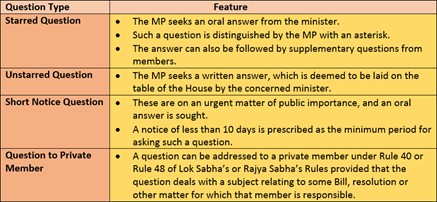Ahmedabad
(Head Office)Address : 506, 3rd EYE THREE (III), Opp. Induben Khakhrawala, Girish Cold Drink Cross Road, CG Road, Navrangpura, Ahmedabad, 380009.
Mobile : 8469231587 / 9586028957
Telephone : 079-40098991
E-mail: dics.upsc@gmail.com

MPs’ Right to Question
News: Congress Whip Jairam Ramesh has raised the issue of Cabinet ministers not responding to questions in the Rajya Sabha claiming it to be first such incident in 70 years.
Details:
• In both Houses, elected members enjoy the right to seek information from various ministries and departments in the form of starred questions, unstarred questions, short notice questions and questions to private members.
• Usually, MPs’ questions form a long list, which then go through a rigorous process of clearance.
• The admissibility of questions in Rajya Sabha is governed by Rules 47-50 of the Rules of Procedure and Conduct of Business in the Council of States.
• Once a question that fulfils the conditions of admissibility is received, the Secretariat sends it to the ministry concerned. Once the facts are received from the ministry, the question is further examined for admissibility.
• A final list of questions is circulated to ministers, on the basis of which they frame their answers.
Types of Questions:
• Starred Question: The member desires an oral answer from the minister. Such a question is distinguished by the MP with an asterisk. The answer can also be followed by supplementary questions from members.
• Unstarred Question: The MP seeks a written answer, which is deemed to be laid on the table of the House by the concerned minister.
• Short Notice Question: These are on an urgent matter of public importance, and an oral answer is sought. A notice of less than 10 days is prescribed as the minimum period for asking such a question.
• Question To Private Member: A question can be addressed to a private member under Rule 40 of Lok Sabha’s Rules of Procedure, or under Rule 48 of Rajya Sabha’s Rules, provided that the question deals with a subject relating to some Bill, resolution or other matter for which that member is responsible.
• In Rajya Sabha, among various norms, the question “shall be pointed, specific and confined to one issue only; it shall not bring in any name or statement not strictly necessary to make the question intelligible; if it contains a statement the member shall make himself responsible for the accuracy of the statement; it shall not contain arguments, inferences, ironical expressions, imputations, epithets or defamatory statements”.
• In Lok Sabha, questions that are not admitted include: those that are repetitive or have been answered previously; and matters that are pending for judgment before any court of law or under consideration before a Parliamentary Committee.

Address : 506, 3rd EYE THREE (III), Opp. Induben Khakhrawala, Girish Cold Drink Cross Road, CG Road, Navrangpura, Ahmedabad, 380009.
Mobile : 8469231587 / 9586028957
Telephone : 079-40098991
E-mail: dics.upsc@gmail.com
Address: A-306, The Landmark, Urjanagar-1, Opp. Spicy Street, Kudasan – Por Road, Kudasan, Gandhinagar – 382421
Mobile : 9723832444 / 9723932444
E-mail: dics.gnagar@gmail.com
Address: 2nd Floor, 9 Shivali Society, L&T Circle, opp. Ratri Bazar, Karelibaugh, Vadodara, 390018
Mobile : 9725692037 / 9725692054
E-mail: dics.vadodara@gmail.com
Address: 403, Raj Victoria, Opp. Pal Walkway, Near Galaxy Circle, Pal, Surat-394510
Mobile : 8401031583 / 8401031587
E-mail: dics.surat@gmail.com
Address: 303,305 K 158 Complex Above Magson, Sindhubhavan Road Ahmedabad-380059
Mobile : 9974751177 / 8469231587
E-mail: dicssbr@gmail.com
Address: 57/17, 2nd Floor, Old Rajinder Nagar Market, Bada Bazaar Marg, Delhi-60
Mobile : 9104830862 / 9104830865
E-mail: dics.newdelhi@gmail.com